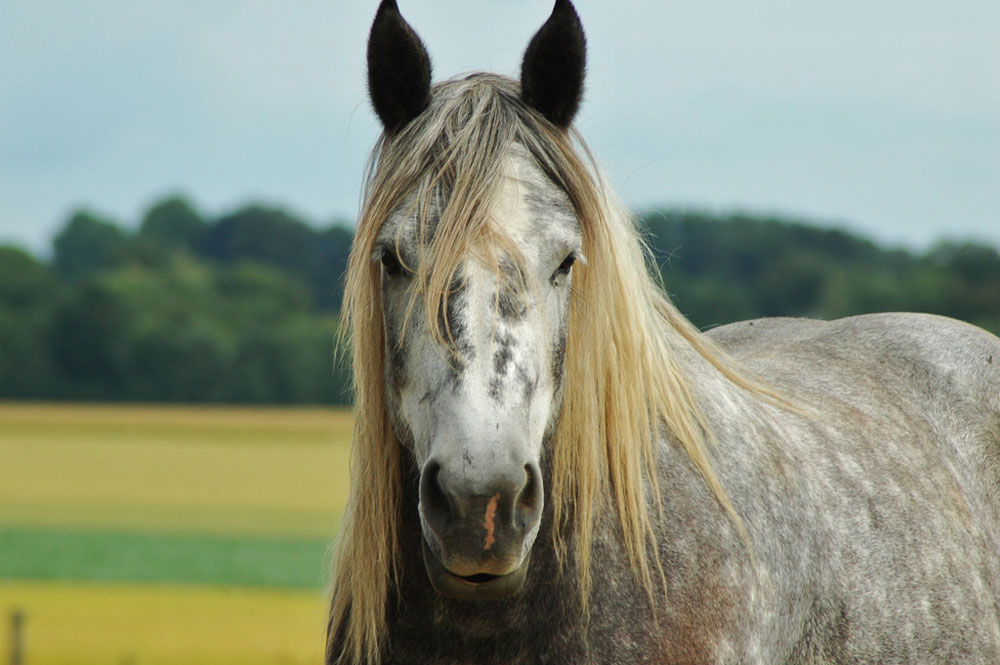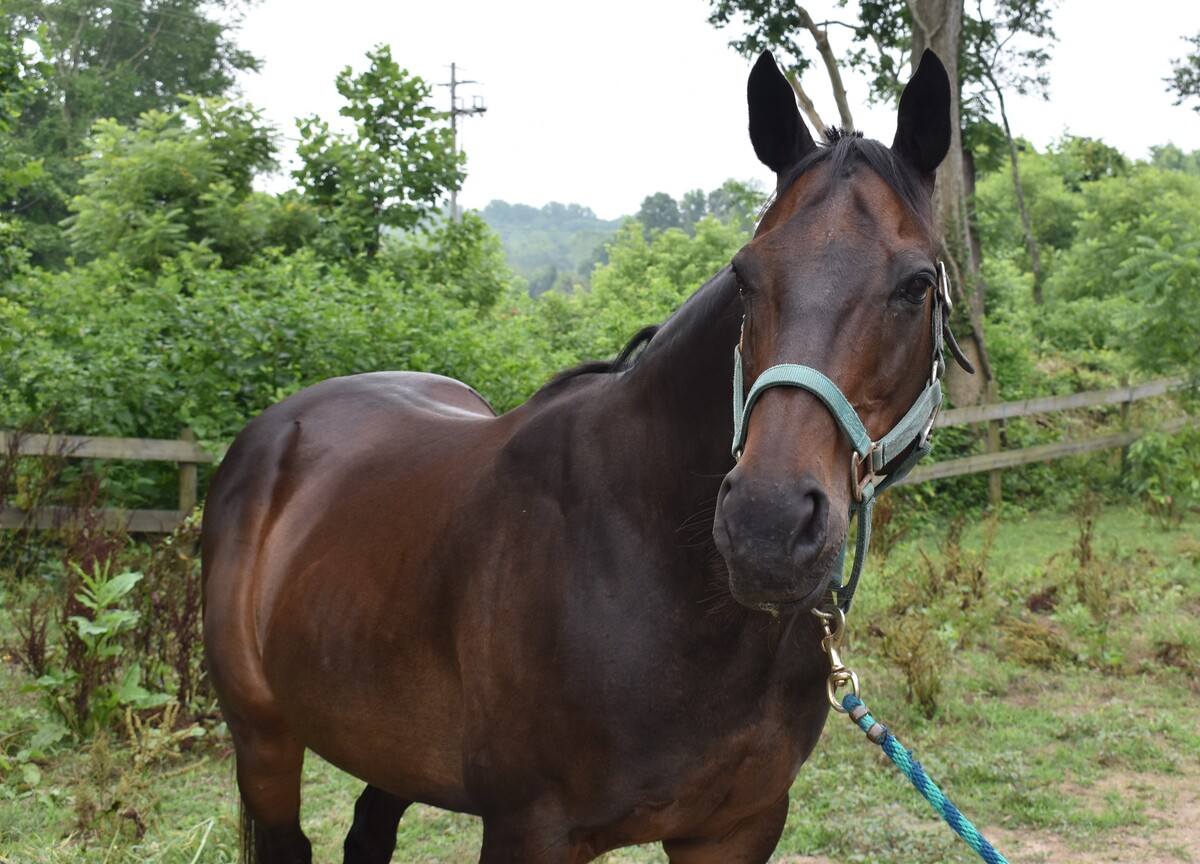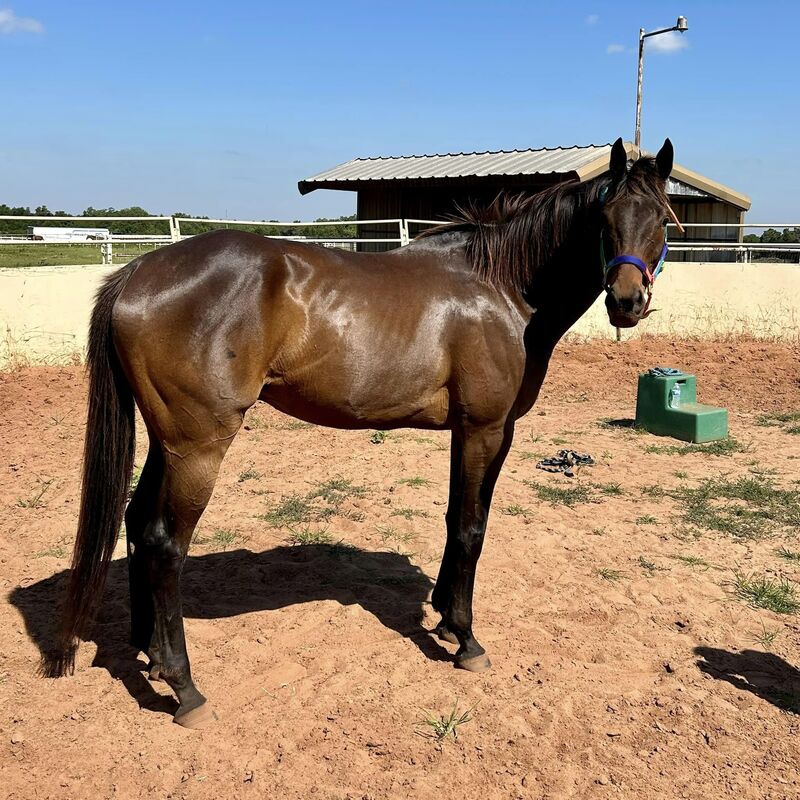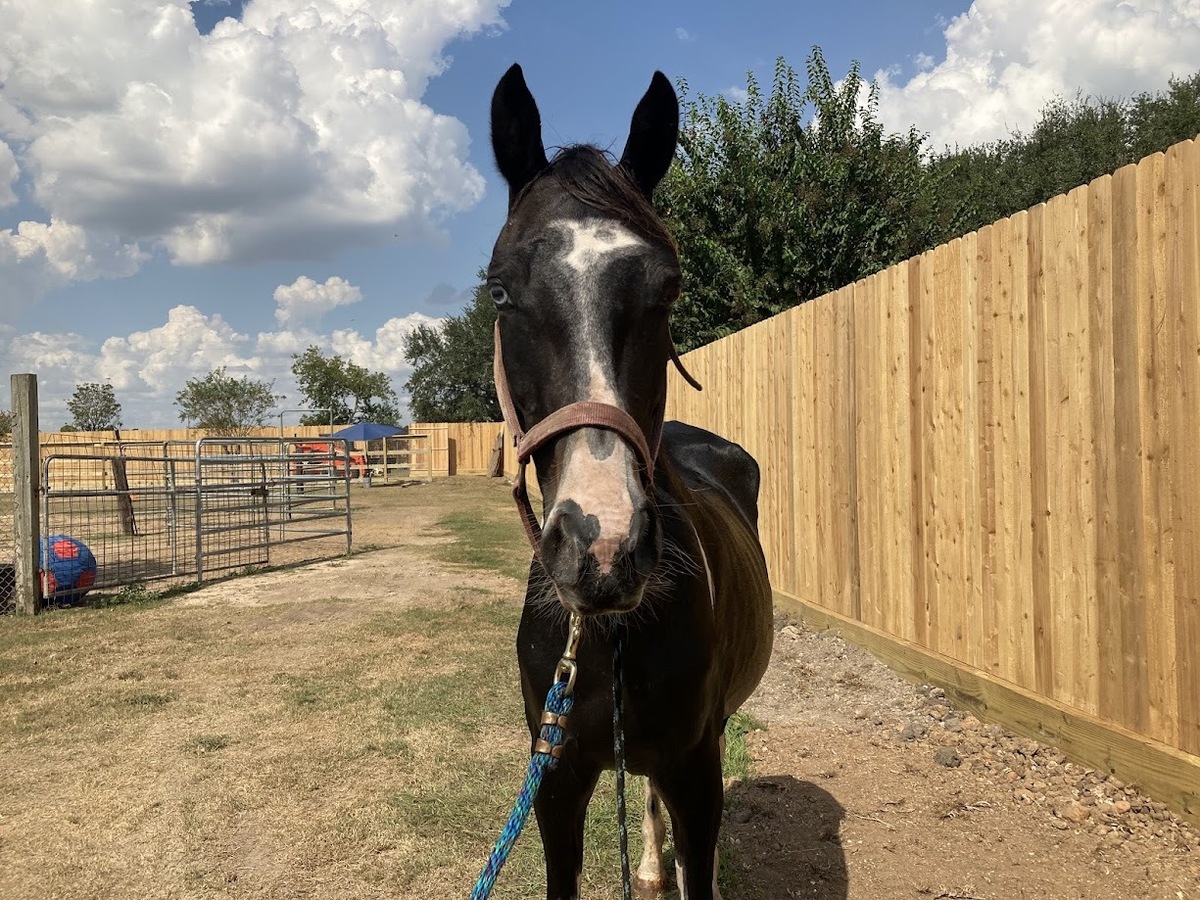Erika Lipton, an artist from Newton, N.J., had a dilemma: After years of trying to foxhunt with “hot” horses, she wanted a young, unspoiled horse with a great temperament to bring along. The problem was, she didn’t have a fortune to spend.
But Erika is well on her way to realizing her dream with RU Rolex, a filly purchased as a yearling. Now 2 years old, Rolex, a Belgian/Paint cross, has an easy personality, is a quick learner, loves attention and is rock-steady. In her first trail outing, Rolex rode with a group, crossed a deep river, experienced dogs running between her legs, passed by things that rattled more experienced horses—and never flinched. She’s been out on the foxhound course at the walk and trot and has pulled a cart for short drives. She’s been shown in-hand at the American Warmblood Society breed inspections and is now a certified warmblood. Rolex is a PMU horse.

What is a PMU Horse?
The PMU horse was born—or created—in the early 1940s when Wyeth, a pharmaceutical manufacturer, contracted with large breeding farms in Canada and the United States to collect pregnant mare’s urine, a source of estrogen used in Premarin, Wyeth’s hormone replacement therapy. A by-product of the industry was, of course, the resulting foals, known as PMU horses. Born in late spring, these foals remain with their dams until autumn, at which time they are weaned and most are sold.
Animal rights groups oppose the PMU industry because of practices many deem inhumane, including tethering the pregnant mares to urine-capturing devices for months on end, during which time the horses are kept in stalls and not turned out. In most cases, the mares are rebred annually and returned to the production lines for urine collection. As a result, each year brings a surplus of PMU foals on the market—few of which had any known performance bloodlines in the past. Many of the unwanted youngsters end up bound for slaughter.
The PMU foal crop has steadily climbed over the decades, but public awareness about the practices used to obtain the urine, along with warnings from the National Institutes of Health about serious side effects associated with Premarin use, have lead to industry changes, including a recent downsizing.
Industry Update
Only a few years ago, there were approximately 430 PMU ranches with about 33,000 mares and nearly that many foal births a year. But falling sales of Premarin caused Wyeth, in 2003, to terminate contracts with many PMU farmers and to ask remaining producers to reduce their collection of pregnant mares’ urine. Today, the North American Equine Ranching Information Council (NAERIC) website states that there are 7,000 broodmares in the PMU industry.
“When those cutbacks were announced, many farms panicked, selling off entire bands of mares before the market got flooded,”says Joanne MacKinnon, marketing consultant and equine sales agent based in Canada. Prices for PMU horses plunged as much as 90 percent, with $1,600 mares selling for as low as $125. With the panic and cutbacks, the market and rescue community became saturated with breeding stock and foals, making it tougher to find private homes for all the PMU horses.
Shortly thereafter and for unrelated reasons, prices for meat horses rose. As a result, Joanne says, meat buyers outbid rescue groups for PMU and auction horses.
Despite the negative press, some involved with PMU horses insist there is a bright side. Joanne MacKinnon, of Miniota, Manitoba, a marketing consultant and equine sales agent for about a dozen Canadian farms, explains, “Contrary to public perception, some PMU farms have been breeding world-class horses for years. Additionally, throughout the past two decades, many more PMU breeders have worked hard on improving their breeding programs, with the goal of producing top competition horses.”
Sporthorse Style
Ravine Ranch Sport Horses, in Lenore, Manitoba, is a family enterprise that produces warmbloods. “We are first and foremost a sporthorse breeding farm,” says Deb King of Ravine Ranch Sport Horses. “Our family’s future and reputation depends on the quality and excellence of the warmblood horses that we raise and sell. Our professional relationship with Wyeth is also very rewarding and financially beneficial to our breeding farm. The income we receive from Wyeth through the sale of our product [pregnant mare urine] helps us provide the very best care for our horses. As dedicated warmblood breeders, we consider ourselves extremely fortunate to receive this additional revenue.”
In the not-so-distant past, only a handful of PMU ranches were active in breeding sporthorses. Traditionally, stock- and draft-type horses have been more prevalent. “The North American Equine Ranching Information Council (NAERIC) started a program several years ago, the CanAm Sporthorse program, to promote Thoroughbred/draft crosses bred on PMU farms as a viable alternative to expensive warmbloods,” Joanne MacKinnon says. “Now there are 18 PMU farms listed as breeding horses for that program on the NAERIC website, some of whom breed registered warmbloods, warmblood/Thoroughbreds and warmblood/draft crosses.
PMU breeders hope that those crosses start making their marks soon, as have their PMU cousins in other classes. Blueboy Dreamer, for example, is a five-time All American Quarter Horse Congress Champion, Reserve AQHA World Show Open Champion, Open and Senior AQHA High Point Trail Horse and AQHA High Point Junior Trail Horse. Apache Blue Boy is a two-time AQHA World Show Amateur Champion in Amateur Dally Team Roping, Heeling Event. Northern Lights Eros captured the World Percheron Congress Champion in Junior Geldings, Yearlings and Two-Year-Olds.
These achievements demonstrate that with thoughtful breeding and proper training, PMU horses, like any other breed, can compete at high levels. “Those breeding world-class horses are, just as in the rest of the equine community, a minority,” Joanne MacKinnon says.
Buyer Basics
The Internet is the best resource for locating PMU horses for sale, says Shannon Empson of Hedgeville Farms in Canada. Many ranchers host their own websites, the NAERIC website provides contacts and links, and PMU organizations and rescue groups are also represented on the Internet.
Typically, buyers purchase PMU horses directly from the ranchers. “Many ranchers hold auctions or joint auctions with other ranchers, “Empson explains. “We sell most of our horses individually from our farm or through our website. Some ranchers have brokers in various parts of North America that will buy large numbers of horses and then distribute individually.”
Interested parties can also purchase PMU horses through the annual NAERIC yearling auction at Rutgers University (these horses are part of a young horse research and teaching program) and through PMU horse rescue groups.
After deciding on a few candidate horses, purchasers should contact the seller to learn more about the individual horses. Because there are so many types of PMU horses, it’s important to find out as much as possible about the prospect.
In addition to evaluating the horse’s conformation and temperament, ask about the horse’s background and health status, suggests Steve Dryden, co-owner and marketing representative for Early Dawn Sport Horses, Virden, Manitoba.
What’s been done with the horse regarding vaccinations, deworming, hoof trimming, feeding regimen, handling and schooling? Does the horse have a valid Coggins test, current export health papers, registration papers or proof of pedigree?
Factor in delivery of your PMU purchase as well. Some ranchers can arrange for delivery with a professional hauler, while other ranches deliver their horses to drop-off points.
Diversity
The diversity of what is produced on PMU farms is as wide as the general horse breeding community. “PMU farms breed everything from AQHA horses for all disciplines to Standardbreds for the racetrack,” Joanne says. There are barrel racers, working cow horses, ranch horses, hunters, jumpers, 4-H mounts, pleasure horses, endurance trail horses, hitch horses, pulling horses, police mounts.”
Not surprising, that diversity extends to breeding stock, as well. Jennifer Johns, director of The Animali Farm, a PMU horse rescue organization based in Santa Maria, Calif., says, “Some PMU farms breed registered purebred horses, primarily Quarter Horse, Appaloosa, Paint and draft breeds. Others breed draft/Thoroughbred crosses, hoping to compete with the expensive European warmblood horses. Many of the PMU ranchers in Alberta were producers of registered horses before they were recruited into PMU.”
Hedgeville Farms in Nesbitt, Manitoba, has been breeding Arabian horses for more than 30 years. During its stint as a PMU producer (the Hedgeville Farms contract with Wyeth ended in January 2006), Hedgeville Farms expanded into Arabian/draft crosses. “Draft mares—usually Belgians, Percherons or Clydesdales—are used on the PMU line, as they are known to produce a higher volume of PMU with a higher concentration of hormones,” explains Shannon Empson, marketing manager for Hedgeville Farms. “Many ranchers crossbreed their draft mares to create more saleable offspring—most commonly to Quarter Horses and Thoroughbreds.”
Besides sport and recreational uses, the draft-cross tendency toward size, good disposition, and durability makes PMU horses the “breed” of choice for several mounted police units as well as the National Police Horse Academy (NPHA). Kimberly S. Herbert, president and a founding board member of NPHA, and an advisory board member for the Lexington Mounted Patrol in Lexington, Ky., explains, “The NPHA program places 6-month-old PMU weanlings into schools with equine programs designed to desensitize young horses, developing a horse that is suitable for entering mounted police work at age 4. The NPHA works only with PMU horses, primarily Percheron/Thoroughbreds or Percheron/Quarter Horses.”
Uncertain Future
The qualities of a PMU horse, as with any other horse or breed, owe much to the qualities of its parents. “Most PMU ranchers take great care in selecting mares and stallions to ensure they produce marketable foals,” Shannon Empson says. “Granted, this does not account for every PMU farm. There are still many farms that simply breed big grade draft horses.”
Ill-bred horses of any breed don’t have much of a future, often ending up being sold at auction and for slaughter, and the same can be said for PMU horses. Unfortunately, it’s a sorry fact that, regardless of horse quality, there has always been more PMU foal crop per year than homes for PMU foals—about 30 percent of PMU foals end up at auction, according to the NAERIC website.
Another factor is supply versus demand. “The four ranches we are helping are in a town of about 250 families,” says Jennifer Johns. “These four ranches produced nearly 1,000 foals annually in their heyday, and they were not the only PMU ranches in that town. These foals were traditionally sold in auctions or production sales within a couple of weeks of each other. There are not enough locals to buy them all, and not enough other buyers traveling in to buy foals. The meat buyers take all that is left over.”
The last couple of years have seen a spike in PMU horses going to auction, a consequence of falling sales of hormone replacement therapy and the resulting cutbacks in the number of PMU farms and production mares.
During the past 18 months, The Animali Farm rescued 600 PMU mares and foals. “At the last auction we attended in Alberta, in June 2004, over 70 percent of the horses went for meat,” Jennifer says. “They included mares with 2-week-old foals at their sides and mature breeding stallions. Not very many of them went to private buyers. Two killer buyers stood together at the side of the ring, bidding against each other. The horses in this sale had been bathed, their feet were freshly trimmed, as were their bridle paths. They were wearing fancy silver show halters, and were groomed accordingly. This did not change a thing.”
Wyeth’s reductions forced a lot of horses into the market, putting many of them at risk for slaughter, says Andrew Lang, DVM, former director of Equine Programs for the American Society for the Prevention of Cruelty to Animals (ASPCA), who has studied the issue. The hope would be that the Wyeth cuts will reflect a reduced PMU foal crop in the future.
It was hearing about the plight of auction-bound PMU horses that prompted Nancy Clark, of South Lyon, Mich., to purchase a PMU horse from a farm that was losing its Wyeth contract. After viewing website photos of available PMU yearlings, Nancy chose a dark, slightly homely filly, worried that no one else would choose her. Tali, a draft/Paint/Quarter Horse/Arabian cross was a bit wild from not having much handling. “She didn’t want to be touched, would run from us in the stall, and had to be sedated to have her hooves trimmed,” Nancy recalls. “Being a large, draft yearling, she was a bit intimidating.”
After spending a lot of time gently working with Tali in the stall, the youngster got over her fears. “Today, at age 2 years, Tali is the sweetest of all the horses, standing perfectly for her hoof trimming and shots. She loves to be petted and fussed with, is great with the other horses, calm yet playful, and a very smart, trusting horse. If she is afraid of something, it really doesn’t take much to convince her it’s OK,” Nancy says.
Purchasing a PMU Horse
The process of buying a PMU horse is usually a little different than purchasing other types of horses. Most PMU horses are sold as weanlings, although some ranches sell yearlings and older horses as part of their herd management process (and, more recently, to reduce the numbers of breeding stock due to the Wyeth cutbacks).
Also, many PMU youngsters receive little handling. “Most PMU horses have had a different lifestyle than most performance horses,” Shannon Empson says. “They aren’t usually foaled in box stalls and imprint trained, nor are they made into pets from dayone. They are often handled as livestock when moving from barn to corral to trailer.”
The reduced amount of handling is due to the nature of the PMU industry, which until recently encouraged ranchers to get bigger. “A single ranch could have anywhere from 40 to several hundred mares in production,” Shannon explains.
“When working with these quantities of animals, it is only economical that they be handled in groups. We work with the horses enough to be able to function as a ranch. Mares are moved in and out of barns, in and out of trailers, in and out of pastures, herded in groups. Beyond that, they are tied in the barn, harnessed up with the urine collection harness, fed, watered, brushed and then left alone until next time they need to be moved and a hoof trim now and then. It’s not that they aren’t handled, it’s more that they aren’t handled the generally accepted way most riding and performance horses are. Foals are often foaled naturally in the pasture and left to graze the entire summer with their moms. And thus, when they are weaned in the fall, they have had little handling at that point.”
Although the PMU horse is evolving amidst some controversy and perhaps facing an uncertain future, depending upon the way the hormone replacement therapy issue goes, it is sure to continue making headlines.
NAERIC
The North American Equine Ranching Information Council (NAERIC) was formed to represent and promote the interests of PMU horse breeders and ranchers. As such, NAERIC has sponsored competitions for NAERIC-registered horses and, by the end of 2006, expects to pay out approximately $2.25 million in matching funds for NAERIC-registered horses through purses, breeders’ trust funds and other incentive programs. They also sponsor a 4-H development project and police horse program.
For more information, visit www.naeric.org
This article originally appeared in the March 2006 issue of Horse Illustrated magazine. Click here to subscribe!






I can’t believe that people would do such horrible things to these poor foals. I am planing to by one in March or April. I am 12 years old.
I took pity on these pmu horses in August 2004. I spent $1850 on two and waited to have them brought to CA. A few days before the shipment was supposed to begin, I got an email telling me that I was not getting the two horses I bought…and the farmer was keeping the money. The person who was the broker for this farmer is mentioned in your article.
After many promises that I would receive a refund, the broker finally paid me $400 in April 05. We kept in contact and became what I considered to be friends. Then, she dropped off the face of the earth in March 06 and I haven’t heard a word out of her since.
I was cheated out of $1450, never got the horses I bought and the broker or the farmer got my money.
I will never buy a pmu horse again unless the horse is here in the US and I can go see the horse first. Buying off the internet with only a picture to go by is the biggest scam going. Many people have been ripped off by charlatans and frauds peddling these horses. I tell everyone to stay away from buying pmu horses.
It saddens me to hear the outcome of the PMU mares and foals. Five years ago my doctor put me on Premarian following my hysterectomy. I researched the drug and that is when I saw the gruesome pictures of the foals and mares. I promptly printed out about fifty copies of the article (with pictures), returned to my doctors office and proceeded to distribute the information to all who worked there and the patients I could find. I have been telling every woman who has to decide about hormone replacement therapy, the plight of the PMU mares and foals. Now—I read, they are going to slaughter any way! I thought I was helping them but now I feel like I have personally sent them to their death in the most inhumane way!
Surely, the there is something that can be done! Can’t the Wyeth company and others like them be made to care for the poor animals that they have done this to? If there was any way possible for me to care for them all, I would.
Thank you for continuing to inform all of us on the situation of the foals and mares who can’t ask for help themselves but need it from all of us.
What kind of regulations are there for these PMU farms. Is any agency watching over how these horses are being housed, exercised, handled, treated in general? They are animals afterall. Although some may think “livestock” is just that, this “inventory” deserves to be treated humanely. There are already more horses out there than potential owners. Its a shame to think these entities feel these beautiful creatures are that disposible that they can add to the problem and then sell the excess to slaughter. Who is keeping an eye on this and what are the laws?
just wanted you to know that I purchase a PMU mare in foal 3 years ago (the foal lived 12 hours only) but my mare is a wonderful horse (TB/Perch Cross). So there are some happy endings to be told.
I have puchased 5 PMU sport horse foals over the last 3 years from 4 different ranches,all very reputable and in fact I keep them with a boarding ranch until they are 3 yr olds when they are saddle broke and shipped to the states.( The breeders are happy to recomend these boarding ranches (Leroy Byreys in Rocanville,SK board mine and our families have become great friends over the years he has boarded my horses.this costs one fourth of what it would cost to board them in the states until old enough to ride.They are allowed to stay in a herd and roam the pastures in the good weather and are moved closer to the farm buildings in the winter but still live outside with suplimental hay and grain.All have been in excellent condition and well handled when they arrived at my farm.I wouldn’t buy anything but PMU’s from They have the best minds size and health of any horses I have seen.
Sorry I mistyped Leroy Byers name.Every good Pmu Ranch in SK Knows him.I have also visited the Farms where I bought my foals in the summer and I have never seen such healthy ,fat dappled horses.The ranchers love their horses and the ones I know can name all their 100+ horses and know everyones previous foals as well The bad deals are very far and few between and usually involve someone trying to get the foals for killer price .The really quality foals are not cheap although very reasonably priced compared to the some non PMU ranches in the states.The money they make on the urine helps keep the prices down on the foals The ranchers don’t want them to go to the killers either.
And people wonder why there’s so many unwanted horse’s around. PMU med’s are on the way out, why aren’t these ranches gone too?
If you’re a PMU rancher, please reduce the “kill” herd. Those mare’s aren’t going to be any good to anyone either. What would your attitude be if you were treated like that?
I purchased a PMU mare from a person who got her from another person who got her from a PMU farm. I am trying to find out more info from where she came from…the only thing we have to go by is her brand which is a very large WRK1 anyone know where I can find out more about her branding?